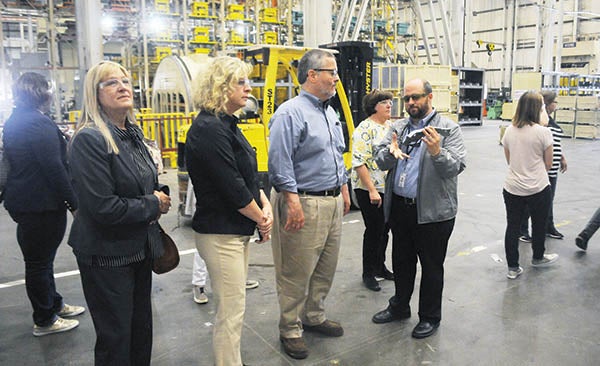Educators tour workplaces, seek employment solutions
Published 12:08 pm Wednesday, April 17, 2019

- Hwashin America HR Director Josh Simmons speaks to Butler County School System staff members. | Photo by Mark Rogers
|
Getting your Trinity Audio player ready...
|
Educators in Butler County had the chance to see firsthand the skills their students need to find good jobs in the area.
Last Thursday’s Educator Workforce Academy gave teachers, counselors and administrators the chance to tour area industries and speak with company representatives about the skills needed to find employees in today’s work world.
The educators began the day with a meeting at the Butler County School System’s board offices and then toured REF, Pioneer Electric and Hwashin America before returning to discuss their findings.
“We’re exposing administrators to the world of work to make what they are doing in the classroom more relevant,” Rheta McClain, Butler County Career Academy director, said. “We want to prepare our students for real-world experiences. This is a real-world experience that teachers and administrators can take back to their buildings and share with students.”
The program, which was a first for the Butler County School System, gave the tour members a chance to see what employers need out of their students.
“With the partnership between career tech and local businesses and industries, we’re trying to do our part to build a better workforce,” McClain said. “How do you do that? You get into industry and you find out what the skills and requirements are. You duplicate that within the schools.”
Cleve Poole, vice president of economic development and legal affairs at Pioneer Electric Cooperative, spoke about what employers need from the schools and what employees need to know when entering the workforce.
“Ultimately, all employers have three employment needs,” Poole said. “Short-term, long-term and mid-term — this is a pipeline of employment from K-12, starting out at the very beginning and trying to prepare students for the workforce. These employers are able to talk to the teachers and tell them the shortcomings they see in the schools’ product. Hopefully, the schools can address those issues.”
Poole said employers have concerns when it comes to today’s workforce.
“Some of the bigger issues are work ethic and showing up to work on time,” Poole said. “Some of the things are things like being able to read a tape measure or do simple math. A lot of those things can be addressed at the school. Unfortunately, a lot of kids today aren’t getting a lot of typical work skills, life skills at home. This is to impress upon the teachers to whenever they have the opportunity to make sure that the kids understand that.”
Industry leaders said major reasons for employees being discharged are often simple ones such as not showing up on time or taking too long on breaks.
“If teachers are firm on tardiness and they teach their kids to get to class on time, maybe that will help that sink in,” Poole said. “By the time they get out of high school, these students will have a better understanding as to why that is important. A lot of kids today have an entitlement — you’re not going to start out as CEO in the business, you’re going to start at the bottom and wok your way up. In order for them to be something other than en entry-level employee, you have to stick with it to get more skills. When you get more skills, you have more value and you get paid more.”
McClain said future sessions will include trips to junior colleges and more meetings with business and industry leaders.
“We want to ask them what we can do to help develop better employees for them,” she concluded.





